South Africa is considering bids from Russia and Iran to expand its nuclear energy capacity, a move that could deepen tensions with the U.S. and stall a long-awaited strategic energy pact.
The country aims to add 2,500 megawatts of nuclear power to ease rolling blackouts and cut emissions. “We can’t have a contract that says Iran or Russia must not bid,” Energy Minister Gwede Mantashe said in Cape Town. “If they have the best offer, we’ll consider them.”
The statement comes amid growing scrutiny from Washington. Earlier this month, President Donald Trump suspended U.S. aid to South Africa, accusing it—without evidence—of strengthening nuclear ties with Iran. Pretoria denies any nuclear cooperation with Tehran.
Energy Security vs. Diplomatic Risks
South Africa, home to Africa’s only nuclear plant, Koeberg, has faced years of delays in its nuclear expansion. A planned tender last year was postponed due to legal challenges. Meanwhile, a crucial U.S.-South Africa civilian nuclear agreement, known as a Section 123 Agreement, expired in 2022 and remains in limbo.
READ MORE: Ghana Targets Payroll Corruption With Probe Into 81,000 ‘Ghost Names
“The allegations in Trump’s order complicate renewal talks,” said Isabel Bosman, a nuclear researcher at the South African Institute of International Affairs. Without a new pact, power utility Eskom may struggle to source nuclear fuel from U.S. suppliers like Westinghouse, analysts warn.
The nuclear industry is experiencing a global resurgence, with private firms like Bill Gates-backed TerraPower exploring international opportunities. But without a renewed U.S. agreement, South Africa risks being sidelined.
“As far as we know, both sides remain committed to finalizing the deal,” said Zizamele Mbambo, a senior energy official. However, ongoing legal and diplomatic hurdles mean that South Africa’s nuclear future—and its geopolitical alliances—hang in the balance.




